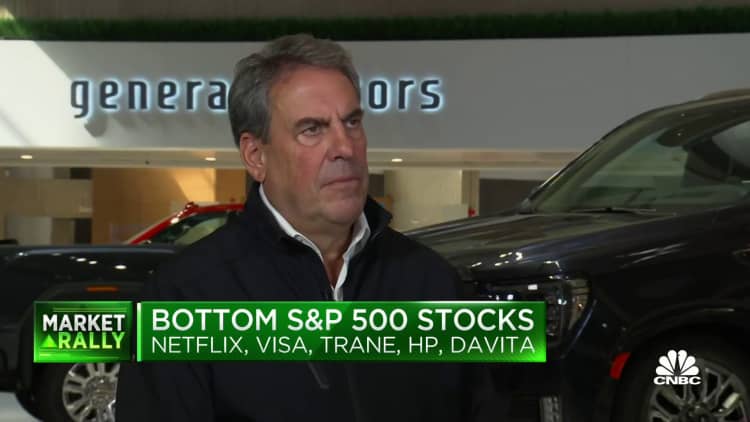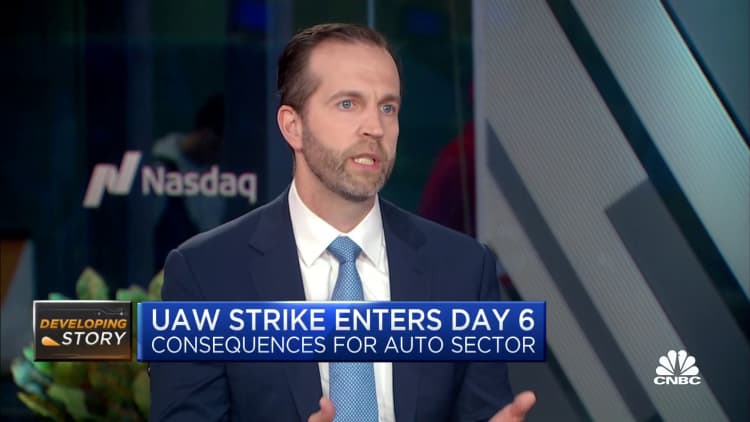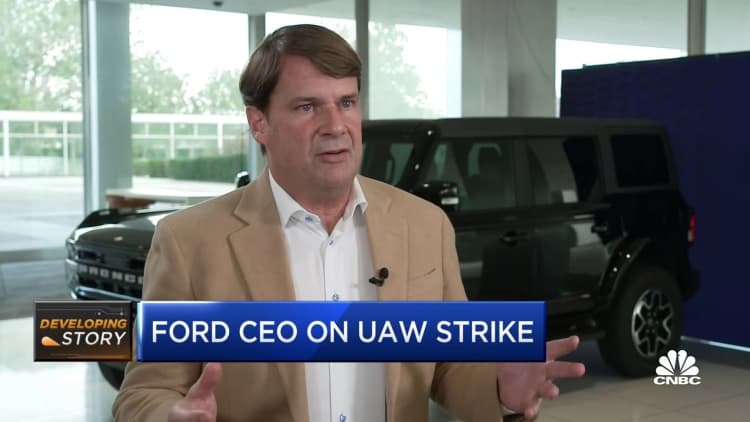[ad_1]
Breaking with the long-standing tradition of the “handshake ceremony” with the auto executives of the Big Three auto makers to open contract talks, United Auto Workers president Shawn Fain instead speaks with and does “members’ handshakes” with Stellantis workers at the Stellantis Sterling Heights Assembly Plant on July 12, 2023 in Sterling Heights, Michigan. The UAW opens auto contract negotiations with Stellantis today, Ford on July 14, and General Motors on July 18. (Photo by Bill Pugliano/Getty Images)
Bill Pugliano | Getty Images News | Getty Images
DETROIT – As the United Auto Workers union enters day six of targeted strikes against the Detroit automakers, General Motors President Mark Reuss is criticizing union leadership for its rhetoric and “flow of misinformation” during the ongoing contract negotiations.
Reuss, in an editorial, focused on the union’s public bashing of the company and elements of GM’s “record” contract proposal last week that included 20% pay raises and improved time off, bonuses and other benefits over the four-year term of the deal.
“As the past has clearly shown, nobody wins in a strike,” Reuss said in a Wednesday column in the Detroit Free Press. “We have delivered a record offer. That is a fact. It rightly rewards our team members, while positioning the company for success in the future. Often in these situations, the clouds of rhetoric can obscure reality.”
The UAW hasn’t responded to the op-ed, as of Wednesday morning.

GM’s last offer was made Sept. 14, ahead of the union initiating a “Stand Up Strike” at one assembly plant each for GM, Ford Motor and Stellantis. UAW President Shawn Fain said Monday the strikes will expand at noon Friday unless “serious progress” is made in negotiations.
Currently on strike are roughly 12,700 UAW workers from GM’s midsize truck and full-size van plant in Wentzville, Missouri; Ford’s Ranger midsize pickup and Bronco SUV plant in Wayne, Michigan; and Stellantis’ Jeep Wrangler and Gladiator plant in Toledo, Ohio.
What did GM offer?
Reuss said GM’s offer, which the union countered, recognizes “the many contributions our represented team members make to our company — past, present and future.”
Under the deal, Reuss said about 85% of current represented employees would earn a base wage of approximately $82,000 a year. That’s compared with the average median household income in nine areas where GM has major assembly plants of $51,821, he said.

GM’s current proposal is estimated to cost between $700 million and $1.2 billion over the life of the deal, Wells Fargo’s Colin Langan said in a Sept. 15 investor note. If GM gave in to all the union’s demands, it would cost the company between $6 billion and $8 billion under the deal, Langan said Wednesday on CNBC’s “Squawk Box.”
“There’s a long way to go. We’re talking about fixed-costs, too. That’s the real pain point for the automakers,” Langan said, calling them “material numbers” for the companies.
Key demands from the union have included 40% hourly pay increases; a reduced, 32-hour workweek; a shift back to traditional pensions; the elimination of compensation tiers; and a restoration of cost-of-living adjustments. Other items on the table include enhanced retiree benefits and better vacation and family leave benefits.
‘Untenable’
Reuss said Wednesday that the union’s full demands would be “untenable,” or unsustainable, for the company.
“If we don’t continue to invest, we will lose ground — quickly. Our competitors across the country and around the world, most of whom are non-union, will waste no time seizing the opportunity we would be handing them,” he said.
Mark Reuss, executive vice president of global product development at General Motors Co. (GM), speaks next to a 2019 Chevrolet Silverado pickup truck during the 2018 North American International Auto Show (NAIAS) in Detroit, Michigan.
Andrew Harrer | Bloomberg | Getty Images
Reuss’ comments are the latest by automotive executives as the UAW takes a strategically aggressive approach during the talks, showing little leeway in their demands.
Late Monday, Ford released a lengthy statement fact-checking comments made by Fain, including auto worker wages, company profits and stock buybacks.
It followed Ford CEO Jim Farley last week saying the company would have “gone bankrupt by now” under the union’s current proposals. He’s also criticized Fain for his approach to bargaining.
“We’ve never seen anything like this; it’s frustrating,” Farley told CNBC’s Phil LeBeau last week ahead of the strikes. “I don’t know what Shawn Fain is doing, but he’s not negotiating this contract with us, as it expires.”

[ad_2]
Source link
